Following a link from Brad I saw the lovely Making Websites Should Be Easy and then the handy What is a feed? (a.k.a. RSS) | About Feeds. Add a link to the last to my sidebar.
Category Archives: enviable stuff
Life in Links 58
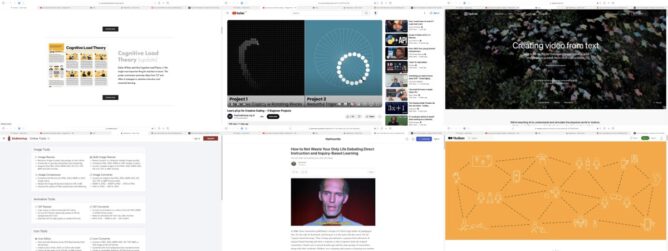
How to Not Waste Your Only Life Debating Direct Instruction and Inquiry-Based Learning
Teachers will do what works for them and they won’t do what doesn’t work for them. It is true that “what works” in a very well-defined context is an empirical question. You can study it. You can referee two different teaching approaches using assessment scores, survey results, classroom observations, meta-analyses—all the usual tools.
Posters — Jamie Clark I like the Dylan Williams influenced ones…
Learn p5.js for Creative Coding – 5 Beginner Projects – YouTube I have played with p5.js on and off, but never got too far. THis course seems short enough to be doable.
Sora Pretty crazy, video AI linked everywhere.
RedKetchup – Online Tools A nice set of online tools to do simple stuff with images that I prefer to do on the desktop. Handy for time I don’t have access to familiar tools. Got a 20 second delay on download if you don’t upgrade, via Aaron
How To Pay Attention. 20 Ways To Win The War Against Seeing | by Rob Walker | re:form | Medium I think I saw this 2014 post a few times before. Still enjoyed it. Some might be fun with class.
Life in Links 57
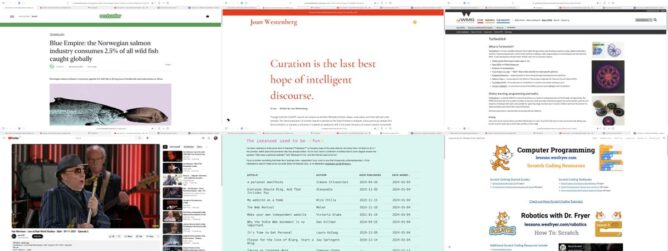
School
Lessons by Dr. Wesley Fryer @wfryer – Scratch Coding We use Scratch a bit in class so adding this to a pile of links.
A variation on Turtle/Scratch stuff, there is some CPD coming up
Turtlestitch is freely available software that enables the generation and stitching of patterns using a digital embroidery machine. It gives programmatic control of the machine, enabling a wide range of patterns to be designed and stitched onto fabric. It was developed by Andrea Mayr-Stalder, and runs in a browser window.
Mac
TipBITS: Always Show Window Proxy Icons – TidBITS Bless TidBITS for this. I’ve been quiety grumbling for a while. As someone with poor window management I’ve alway loved proxy icons.
Internet
The role of human curators is not just to select and present content but to imbue the digital landscape with a sense of reliability and authenticity that only human insight can provide.
Curation is the last best hope of intelligent discourse. — Joan Westenberg
I’ve been meaning to write some kind of Important Thinkpiece™ on the glory days of the early internet, but every time I sit down to do it, I find another, better piece that someone else has already written. So for now, here’s a collection of articles that to some degree answer the question “Why have a personal website?” with “Because it’s fun, and the internet used to be fun.”
The internet used to be fun
Nature
Blue Empire: the Norwegian salmon industry consumes 2.5% of all wild fish caught globally | Ecohustler I avoid Salmon due to the sea lice and the effect on wild stocks here.
Music
Jumping right into the middle:
Life in Links 56
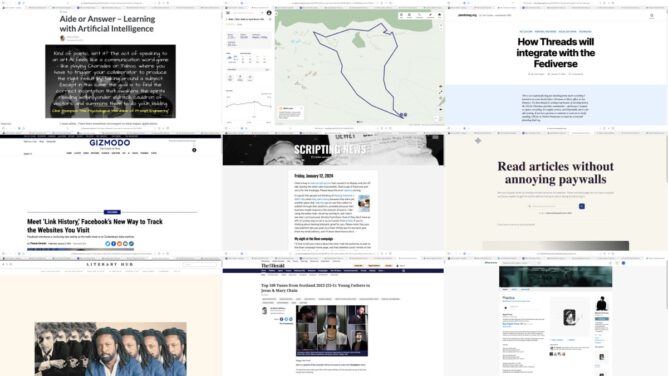
Aide or Answer – Learning with Artificial Intelligence – Read Write Respond
With this in mind, for me I feel that AI tools are useful as an aide, but I am circumspect about using them as the answer. I guess time will tell.
Walk to Auld Wives Lifts I need to have a wee walk to the Auld Wives Lifts
Tom Coates on how Threads will integrate with the Fediverse
Who knows? Maybe we’ll get the interoperable shared, open social web that many of us have wanted for the last twenty plus years? Wilder things have happened. Fingers crossed?
A less positive view of Meta:
Meet ‘Link History,’ Facebook’s New Way to Track the Websites You Visit
As lawmakers introduce tech regulations and Apple and Google beef up privacy restrictions, Meta is doubling down and searching for new ways to preserve its data harvesting empire.
The company pitches Link History as a useful tool for consumers “with your browsing activity saved in one place,” rather than another way to keep tabs on your behavior.
Scripting News: Friday, January 12, 2024
That’s the thing we really need to escape from, being monetized. The only respectful way to be monetized is to pay for something worth paying for, roughly what it costs, plus a reasonable margin of profit.
RemovePaywall | Free online paywall remover
Remove Paywall works by finding archived versions of a website. These archived pages do not have a paywall
and allow readers to get the article without having to pay or being forced to log in.
I think the thing about Led Zeppelin and the Stones is that they dig music–particularly black music–after the fact. The difference between them and Dylan is that Dylan digs culture as it’s happening. And I think that’s a big difference. It’s why Talking Heads sound like Talking Heads, you know?
Top 100 Tunes from Scotland 2023 (25–1): Young Fathers to Jesus & Mary Chain | The Herald
11 Michael Timmons & Yoker Moon – Practice
Recorded mostly live and apparently musically improvised with Glasgow electronic musician Yoker Moon, the East Kilbride songwriter Michael Timmons has placed an evocative and fragile lyrical hook within a tense computer generated soundscape.
My son-in-law at number 11
Life in Links 55

Christmas Cannon everyone needs one of these.
Land for the People (Scotland) Bill – Land Matters Andy Wightman’s proposals for a comprehensive Land Reform Bill.
redefine Scotland’s system of land tenure as conditional tenure with (broadly defined) statutory responsibilities as well as rights. The particulars of how these will be interpreted can be set out in secondary legislation. They will include legal duties to conserve natural processes and restore ecosystems.
bobboteck/JoyStick: A simple JoyStick that use HTML5, Canvas and Vanilla JavaScript, for touch and mouse interfaces I used this for a silly wee #ds106 daily. Might be useful for something for school.
WordPress as a game development platform. – Jonathan Bossenger
There is still a lot of work to be done to turn this into a working game, but I’m excited about the possibilities. Stay tuned, because I can see this turning into a bit of a series of posts…
I wonder if we will get to the point when you can make something simple with html/css/JavaScript in the block editor? I don’t think that is the direction this post is pointing, but it made me think.
Pipes is a spiritual successor to Yahoo! Pipes, but if you did not know that site, you can think of Pipes as a visual programing editor specialized on feeds, or a visual shell, or simply as a glorified feed configurator.
Ready to walk? Swipe down.
I think a lot of these links came from Joe, either directly or by wandering from his starting point. He is a serendipity engine.
Life in Links 54
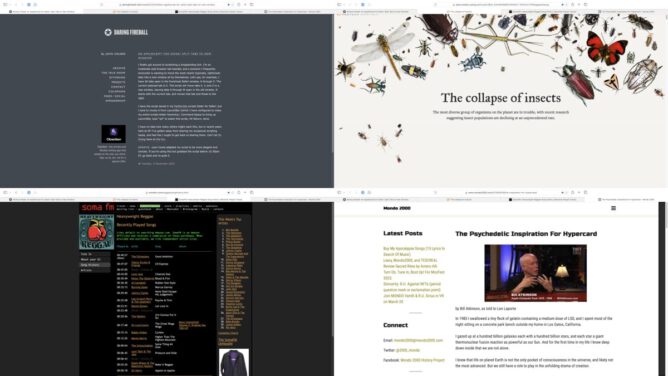
The Psychedelic Inspiration For Hypercard – Mondo 2000 One of the more bizarre HyperCard Links I’ve collected.
HyperCard was a precurser to the first web browser, except chained to a hard drive before the worldwide web. Six years later Mosaic was introduced, influenced by some of the ideas in HyperCard, and indirectly by an inspiring LSD experience.
The collapse of insects A beautiful webpage with a terrifying message.
“Insects are the food that make all the birds and make all the fish,” said Wagner, who works at the University of Connecticut. “They’re the fabric tethering together every freshwater and terrestrial ecosystem across the planet.”
SomaFM Player: Heavyweight Reggae Sounds good to someone with ears of my vintage
Daring Fireball: An AppleScript for Safari: Split Tabs to New Window One of the reasons I subscribed to daring fireball was the scripts.
but in recent years here at DF I’ve gotten away from sharing my occasional scripting hacks, and feel like I ought to get back to sharing them.
Life in Links 53

I am a fan of micro:bits too, these look like great lessons, nicely packaged. CC BY-NC too.
I’ve mostly been avoiding Twitter/X recently, but I still get emails. This looks like it might be fun in class.
I don’t really do much with spotify either, but looking for a poetry podcast I found this one and enjoyed this episode.
Life in Links 52
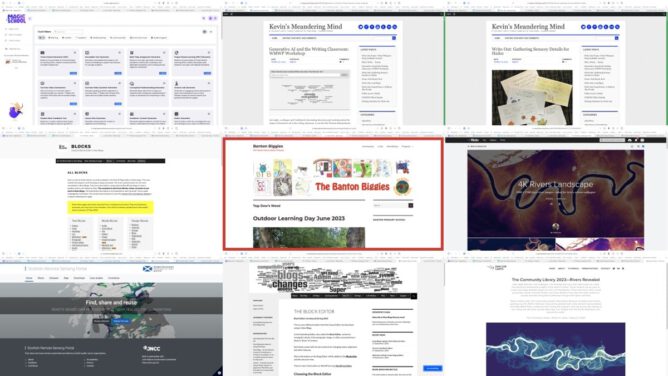
School
MagicSchool is your AI assistant for all things teaching. We think #TeachersAreMagic – and we are on a mission to fight teacher burnout with Artificial Intelligence.
Limitations
May occasionally produce biased or inaccurate information
Only has knowledge up to the year 2021
Cannot search the internet or produce images (yet)
A large set of AI tools for teachers, I’ve only tried one so far. I wonder how they will make money. Sign up for fee is the only thing I can see. I’ve used ChatGPT is a fairly casual way, making crosswords questions and cloze procedures for H2P.
Kevin’s Meandering Mind | Generative AI and the Writing Classroom: WMWP Workshop
Overall, our intentional message was not “the world is ending so ban AI” but more, “this is our new reality, so how can we start to think of AI as a partner to help us as teachers and maybe help our students as writers?” and I think that theme really resonated with the educators who joined us last night.
Also from Kevin, Write Out: Gathering Sensory Details for Haiku which if the weather permits and we can get to the woods I’ll try next week.
Holiday rabbit hole
This
from Tom Woodward
lead to a collection of links including: Dan Coe Carto – The Community Library 2023—Rivers Revealed
Lidar (light detection and ranging) is a technology that uses laser light pulses to create intricate three-dimensional models of the earth’s surface. These models can be used to create stunningly detailed images of rivers and floodplains. These depictions often reveal previously unseen channels where rivers have flowed in the past and invite viewers to visually meander along these pathways through both space and time.
And some local data Scottish Remote Sensing Portal makes me wonder how difficult this would be, it would be nice to do from places I know.
Glow Blogs
I also spent a fair bit of time in the wet weather on Glow Blogs help. Although the classic editor is default on Glow Blogs, we are getting ready for using Blocks. I’ve been updating information and using the blocks editor to do so. I’ve tried all the blocks and am now a lot happier using it.
Featured image: a montage of screenshots of some of the lined pages, my previous script had a few problems with cookie banners, so this one used Safari & takes screenshots. Not as elegant and I think there are a few daft decisions, but it works.
Life in Links 51

Some links and interesting things I’ve noticed over the last couple of weeks
Cardboard
I like using cardboard in school, some inspiration.
2023 C.A.M.P.The Cardboard CollectiveThe Warehouse
As a working artist, I engage with kids as co-creators, seeking to share knowledge and expertise in context as ideas unfold and discoveries are made. I also share the art research processes and methods I use in my own art practice, as we take on projects big and small.
Amber Dohrenwend, Artist – Cool Tools
Amber Dohrenwend is an American artist based in Marquette, Michigan. She constructs post-consumer cardboard sculptures, costuming and installations.
Amber Dohrenwend build an art installation out of locally recycled cardboard strips.
Tech
A tool to help you explore FFmpeg filters.
My use of ffmpeg is very basic indeed, mostly taking images and making video from them. This is much more advanced. I remember trying to make a video grid. Altough that post claims a quick try it took me a while and gave me a real headach trying to expand the grid. FFmpeg Explorer has an example that shows you how with a click. (can’t recall where I got this one, but thanks)
TiddlyPWA — TiddlyWiki Storage & Sync Solution
Have you ever wanted to combine the power and customizability of TiddlyWiki and the convenience of a modern offline-friendly, encrypted, synced notes app? Now you can! With…
HT Joe I use TW a bit at a beginners level. This looks nice and the syncing is interesting.
Media
My daughter sent me this, nice.
Rear Window Timelapse – Jeff Desom
Meticulously assembled using After Effects and Photoshop, Rear Window Loop is a large scale projection that shows Alfred Hitchcock’s 1954 masterpiece as a never before seen panorama.
We were watching a tv show about Hitchcock, reminded me of this video.
Worrying
Daring Fireball: Twitter/X’s Descent Into an Antisemitic Cesspool
Antisemitism is more than just a form of bigotry and hatred, it’s a millennia-old conspiratorial crackpot worldview. And Elon Musk is seemingly sinking into it.
Still the social network of choice by schools in Scotland.
The featured images is a montage of screenshots of some of the links. I’ve done that twice, so made an AppleScript.
Life in Links 50
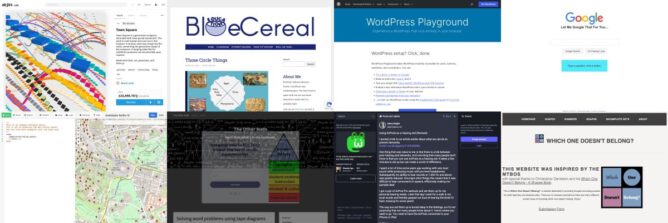
Classroom
The hour approaches…
- Which One Doesn’t Belong?
This is Which One Doesn’t Belong?, a website dedicated to providing thought-provoking puzzles for math teachers and students alike. There are no answers provided as there are many different, correct ways of choosing which one doesn’t belong. Enjoy!
- Solving word problems using tape diagrams – The Other Math
Tape diagrams are especially useful for modeling addition, subtraction, multiplication, division, fractions, and ratios/proportions.
might work in wel lwith Number Talks, or be a break from them. - Those Circle Things – Blue Cereal Education Nice way to start discussion, 4 things, which one is different… no right answer..
You probably figured out pretty quickly that there’s usually more than one solution to which one doesn’t fit and why. These aren’t multiple choice questions with one objectively “correct” answer. It’s the process of examining each item in comparison with the others that forces us to review what we already know, reinforces the information we use to argue whatever point we choose to make as a result, stretches our understanding of each item a bit, and lays the groundwork for actual analysis and argument should we eventually go there.
Maps
- overpass turbo
“…a web-based data filtering tool for OpenStreetMap”
HT Joe. I really like Open Street Map, this makes me like it more.
WordPress
- WordPress Playground
Experience a WordPress that runs entirely in your browser.
…WordPress Playground makes WordPress instantly accessible for users, learners, extenders, and contributors.And
Even more insane and amazing, Ella van Durpe used WordPress Playground as the basis for a new note-taking app for iOS and macOS. Blocknotes is a stripped down version of WordPress that lets you create notes like you would create posts in WordPress.
Fun
- Town Square
Town Square is a generative sculpture, animated with slow-paced movement. The work is code-based and runs live in the browser. A random seed was chosen by the artist, cementing the generative shape of the sculpture. A looping video file for exhibition purposes can be provided upon request. Made with html, css, javascript, and three.js. Creator Anna Lucia
I am often impressed with various html/css/javascript art ideas, this is a lovely one. I’ve occasionally taken baby steps, usually in response to the Daily Create.
- Garry Knight: “Using AirPods as a Hearing Aid…” – Toot.Cat. I might get some AirPods and try this, my hearing is getting a bit worse with age…
- Let Me Google That I recall an old flash thing that did this. Just need a silly question now…

